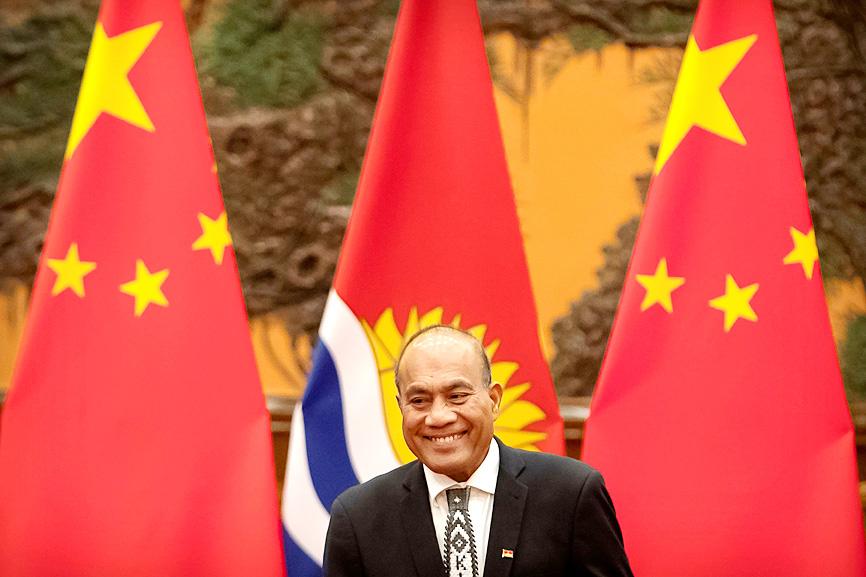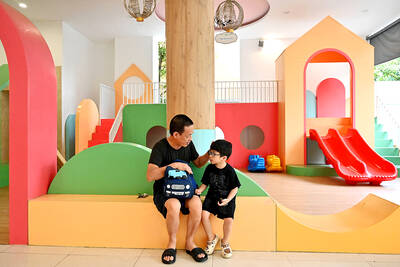Kiribati will raise its islands above the ocean as part of its fight against sea-level rise, seeking help from its new diplomatic partner China to secure the archipelagic nation’s future, the country’s newly re-elected president has said.
In his first in-depth interview since his resounding election win in June, Kiribati President Taneti Maamau told the Guardian that international cooperation would be on Kiribati’s terms.
He said he would not accept large loans “from any country,” and would not allow China to build a base on Kiribati’s strategically significant Christmas Island.

Photo: Reuters
Maamau said his government’s strategy “identifies raising our islands” as a counter to climate change, and plans “to secure dredgers that will assist with these efforts.”
“There are already plans to build up part of Tarawa through dredging fill materials from the lagoon. Kiribati in its 20-year vision has also included strategies to secure dredgers that will assist with these efforts as well as dredging channels in the outer islands,” he said.
Dredging can impact coral reef ecosystems.
“We are also working with New Zealand’s National Institute of Water and Atmospheric Research to develop a long-term coastal security strategy for Kiribati,” Maamau said. “The strategy is still in development but clearly identifies raising our islands as a way forward in our fight against climate change. This is also clearly demonstrated in our national climate change policy.”
Maamau has enlisted the advice of Paul Kench, dean of science at Simon Fraser University in Canada, and a leading researcher on the response of atolls to sea-level changes.
To solve chronic flooding in the overcrowded capital, Tarawa, Kench has proposed replacing causeways — landfill between islands that supports the main road, but which can cause beach erosion — with an elevated bridge road running the entire length of the atoll on the sheltered lagoon side.
A former British colony made up of three archipelagos sprawled over an ocean area the size of India, Kiribati has acquired significant strategic importance in the era of US-China rivalry in the Pacific.
The US military has flagged concerns that Kiribati might allow China to build dual-use facilities on its largest island, Christmas, just 2,000km south of Hawaii, home of the US Pacific Fleet.
Kiribati is already developing fishing infrastructure on Christmas in partnership with a Chinese company.
“There was never any intention or plan by this government to allow China an accessory base in Kiritimati [Christmas],” Maamau said.
He said Kiribati would safeguard its independence.
“My government has no intention to acquire large loans from any country in the near future,” he said.
A treaty between Kiribati and the US prohibits any other country from building military installations in Kiribati without “consultation” with Washington first.
US and Australian concerns emerged last year after Maamau made a sudden and controversial decision in September last year to switch Kiribati’s diplomatic recognition back to China after 17 years allied to Taiwan.
The decision caused the chairman of Maamau’s party to join the opposition — leaving Maamau with a minority in parliament — and run for president against him.
June’s presidential election was seen, in part, as a referendum on the decision to switch from Taipei to Beijing.
Maamau won comfortably, 26,053 to 17,866. Following his victory, several lawmakers crossed the floor to join the government, leaving him with a 24-to-19 majority to pursue his agenda, developing tourism and fisheries, while taking the adaptation measures that would allow Kiribati’s 110,000 people to remain in their homeland.
However, whether Maamau can deliver his promises, and keep Kiribati free from malign foreign influence, will be closely watched, domestically and internationally.

The collapse of the Swiss Birch glacier serves as a chilling warning of the escalating dangers faced by communities worldwide living under the shadow of fragile ice, particularly in Asia, experts said. Footage of the collapse on Wednesday showed a huge cloud of ice and rubble hurtling down the mountainside into the hamlet of Blatten. Swiss Development Cooperation disaster risk reduction adviser Ali Neumann said that while the role of climate change in the case of Blatten “still needs to be investigated,” the wider impacts were clear on the cryosphere — the part of the world covered by frozen water. “Climate change and

Poland is set to hold a presidential runoff election today between two candidates offering starkly different visions for the country’s future. The winner would succeed Polish President Andrzej Duda, a conservative who is finishing his second and final term. The outcome would determine whether Poland embraces a nationalist populist trajectory or pivots more fully toward liberal, pro-European policies. An exit poll by Ipsos would be released when polls close today at 9pm local time, with a margin of error of plus or minus 2 percentage points. Final results are expected tomorrow. Whoever wins can be expected to either help or hinder the

DENIAL: Musk said that the ‘New York Times was lying their ass off,’ after it reported he used so much drugs that he developed bladder problems Elon Musk on Saturday denied a report that he used ketamine and other drugs extensively last year on the US presidential campaign trail. The New York Times on Friday reported that the billionaire adviser to US President Donald Trump used so much ketamine, a powerful anesthetic, that he developed bladder problems. The newspaper said the world’s richest person also took ecstasy and mushrooms, and traveled with a pill box last year, adding that it was not known whether Musk also took drugs while heading the so-called US Department of Government Efficiency (DOGE) after Trump took power in January. In a

IMBALANCE: In Vietnam, a preference for boys has caused the sex ratio at birth to be 112 boys for every 100 girls, despite penalties for gender selection The number of births in Japan last year fell for the ninth consecutive year, reaching another historical low of fewer than 700,000, government data showed yesterday, as Vietnam, which is also battling to reverse a declining birthrate, scrapped its long-standing policy of limiting families to two children. Fast-aging Japan welcomed 686,061 newborns last year — 41,227 fewer than in 2023, Japanese Ministry of Health, Labour and Welfare data showed. It was the lowest figure since records began in 1899. Japanese Prime Minister Shigeru Ishiba has called the situation a “quiet emergency,” pledging family friendly measures such as more flexible working hours to